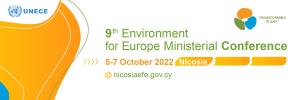How to step up environmental protection, reduce resource use, cut pollution and foster the shift to a circular economy that is needed to make sustainable development a reality? These will be some of the topics at the core of debates when Ministers from the 56 countries of the UNECE region gather in Nicosia, Cyprus, for the Ninth "Environment for Europe” Ministerial Conference (5-7 October).
The Environment for Europe (EfE) process was created in 1991 to support countries’ joint efforts to strengthen environmental governance. The EfE Ministerial Conference, convened every five years and serviced by UNECE, is the United Nations’ highest body on environmental policy in the region.
UNECE Executive Secretary commented: “The EfE process, which began at a time when the region was sharply divided, is a living example of what multilateralism can deliver. Most of the world’s most pressing challenges, including climate change, biodiversity loss, air pollution, floods or drought prevention, not to mention dealing with pandemics know no borders. International cooperation is therefore more important than ever to tackle them. I look forward to hearing bold commitments from Member States and non-government stakeholders in Nicosia.”
This year’s Ministerial Conference will have three main themes:
-
Greening the economy in the pan-European region: working towards Sustainable infrastructure, with the aim of reducing the carbon, water and resource footprint of infrastructure projects. Infrastructure sits at the heart of the Sustainable Development Goals, cutting across all 17 Goals and influencing 92 per cent of their 169 targets.
-
Applying principles of circular economy to sustainable tourism, with a view to reducing water and energy use and greenhouse gas emissions from tourism, particularly in high-impact sub-sectors (including cruise lines, aviation and accommodation), as well as improving efficiency in sanitation, wastewater treatment and waste management. Tourism is a key sector of the economy in many countries in the region, for example contributing 10% to the European Union’s GDP and representing 26 million jobs.
-
Advancing Education for sustainable development, as a powerful catalyst for the implementation of all the Sustainable Development Goals.
The Conference will also:
-
discuss the findings of the 7th pan-European environmental assessment report, taking stock of progress made and remaining challenges since the 6th assessment in 2017,
-
review progress on the establishment of the Shared Environmental Information System
-
launch the 4th cycle of UNECE Environmental Performance Reviews
This is the first time the Ministerial Conference takes place in the Mediterranean. On this occasion, Cyprus has extended invitations to non-European countries of the Mediterranean. The Ministerial Conference will gather some 30 Ministers and almost 1,000 delegates. It is expected to adopt a Ministerial declaration which will outline the direction of future regional cooperation on the environment, and especially on sustainable infrastructure and sustainable tourism. The 3rd High-Level Meeting of Education and Environment Ministries, which will be held in the framework of the Conference, is expected to adopt the Ministerial Statement on education for sustainable development.



